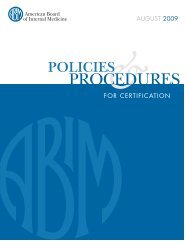The SRA Symposium - College of Medicine
The SRA Symposium - College of Medicine
The SRA Symposium - College of Medicine
You also want an ePaper? Increase the reach of your titles
YUMPU automatically turns print PDFs into web optimized ePapers that Google loves.
Papers<br />
place blame at the feet <strong>of</strong> irresponsible journalists who at best are careless in their reporting, if not<br />
deliberately misleading. Shuchman and Wilkes recommend that members <strong>of</strong> the research community<br />
take an active role in ensuring honest reporting. <strong>The</strong>y suggest that scientists check institutional<br />
press releases for accuracy and clarity; medical journals and sponsors <strong>of</strong> medical meeting<br />
should seek expert advice to place new information in the proper context; the scientific community<br />
must inform journalists <strong>of</strong> any potential conflict <strong>of</strong> interest; and finally, industry sponsorship<br />
<strong>of</strong> research and persons who speak or write about a research should be identified as such.<br />
I agree that research integrity issues are multi-faceted. <strong>The</strong>re are many stakeholders, and these are<br />
not problems for researchers to tackle alone. All <strong>of</strong> us in the research community have a voice and<br />
an important role to play. As Martinson remarked at the conclusion <strong>of</strong> his survey, “We should be<br />
asking what kind <strong>of</strong> aspects in science are fostering [these questionable practices] and are there<br />
ways <strong>of</strong> addressing them to make them better” (Mitchell, 2005).<br />
As citizens in a democratic society, we have a duty to hold issues <strong>of</strong> integrity—in science, business,<br />
politics, education, or elsewhere—to a very bright light. If we fail to do so, those who suffered and<br />
perished as result <strong>of</strong> the Nazi WW-II experiments, were deceived in the Tuskegee Study <strong>of</strong> untreated<br />
Syphilis, or fell victim to research delays in the early—or present—days <strong>of</strong> the AIDS epidemic,<br />
did so in vain. To have learned these lessons, only to discard them for the sake <strong>of</strong> corporate greed,<br />
Nobel-Prize-blind-sightedness, journalistic sensationalism or religious dogma is unacceptable.<br />
Programs like the University <strong>of</strong> Pittsburgh’s “Survival Skills and Ethics” course have sought to address<br />
these issues for twenty years. <strong>The</strong>y attempt to integrate ethics and the responsible conduct<br />
<strong>of</strong> research into every topic. <strong>The</strong> Department <strong>of</strong> Health and Human Services’ Office <strong>of</strong> Research<br />
Integrity <strong>of</strong>fers institutions grant money to develop pilot programs to teach graduate students<br />
responsible conduct <strong>of</strong> research. <strong>The</strong> assumption is that if we make greater efforts to educate<br />
students about integrity issues, then the incidents <strong>of</strong> misconduct will be reduced. However, ethics<br />
education is not a one shot deal.<br />
My trainees in the Tri-institutional Responsible Conduct <strong>of</strong> Research Program (co-sponsored by<br />
Weill Medical <strong>College</strong>, Memorial Sloan-Kettering Cancer Center, <strong>The</strong> Rockefeller University since<br />
the early 1990’s) lament: You can’t force-feed someone ethics. You cannot transform someone into<br />
an ethical being in every instance by mandating course attendance and completion.<br />
Rather, ethics education is an ongoing life-long process that individuals must choose as a way <strong>of</strong><br />
life and that peers, mentors and colleagues must model. Regulations change from administration<br />
to administration, but good science must remain unspoiled by the political flavor <strong>of</strong> the month.<br />
Can we find common moral ground among ideology, pedagogy and reality through mandatory<br />
ethics training? <strong>The</strong>re is power in numbers and unity. For a single university to tackle this dilemma<br />
alone is as foolish as waiting for something to go drastically—and publicly—wrong. RCR<br />
training should not be viewed as “punishment.” Martinson cautions that it would be dangerous<br />
for a single institution to try and address research misconduct in isolation, because this could put<br />
them at a “distinct disadvantage” regarding competition for grants and other resources from other<br />
universities (Mitchell, 2005). As sad a commentary as that is, it is a reality that needs to be acknowledged<br />
and addressed in a way that does not dilute the importance <strong>of</strong> doing what is right for<br />
its own sake.<br />
To date there is no extant empirical data <strong>of</strong> which I am aware to support whether mandatory training<br />
affects ethical behavior and decision-making in a positive way. Of course, if I reach retirement<br />
without seeing my institution or one <strong>of</strong> my trainees in the headlines for scientific misconduct, that<br />
would be a victory <strong>of</strong> sorts. More over, I would be satisfied when I stop seeing cynical evaluation<br />
238 2005 <strong>Symposium</strong> Proceedings Book

















